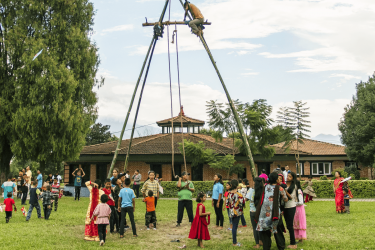5% is donated to the international NGO SOS Children's Villages
The fact that production benefits farmers, manufacturers and artisans is legitimate. We want an even stronger implication, this is why Bhangara transfers 5% of its profits to a rigorously selected association. These funds are allocated to food, school fees, "mom's" salary, clothing and everyday needs.
Foundation of SOS Children's Villages in Nepal
SOS Children's Villages Nepal, an international NGO, has been present in Nepal since 1972, the year of the creation of the village of Sanothimi (Kathmandu). In 2015, the earthquake that struck Nepal was so violent that more than 7,000 people died and left behind orphaned children, broken families.
Missions and functioning
Today, SOS Children's Villages Nepal takes care of 1909 children in 10 villages across the country. The reception system is family: the villages are organized in "homes", where a maximum of 10 children are welcomed. "Moms" (they are so called, and not as staff members) provide personalized care to each child. If the child has uncles or grandparents, contact with them is highly encouraged and privileged in order to avoid separation and uprooting. Their cultures and religions of origin are also respected.
Children go to municipal school so as not to stigmatize them and to soften their integration into society. Children's extracurricular activities are fun (pottery, painting, etc.) and do not have an economic purpose. Children are not required to carry out heavy tasks worthy of adults, nor are they part of construction sites. The association supports them throughout their schooling, even during their higher studies.
The association welcomes, hosts, feeds and educates children of all ages and opens its doors to neighboring families. The rules for admitting children are strict so as not to encourage drop-outs and guarantee their non-exploitation. Since its foundation, 1315 orphans have been reintegrated into society.
